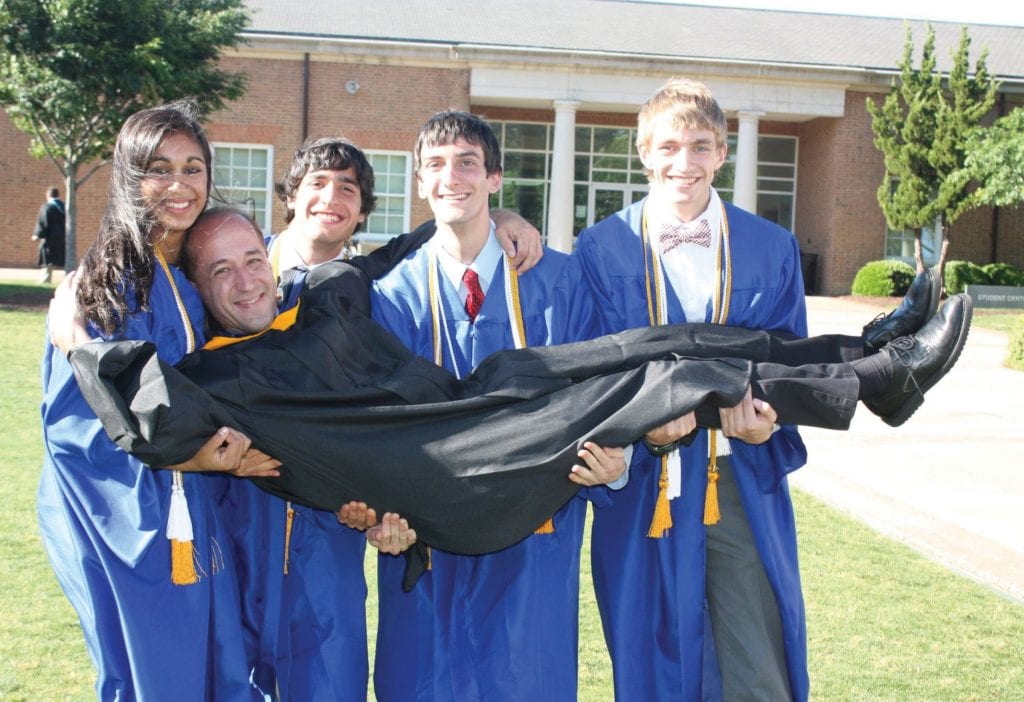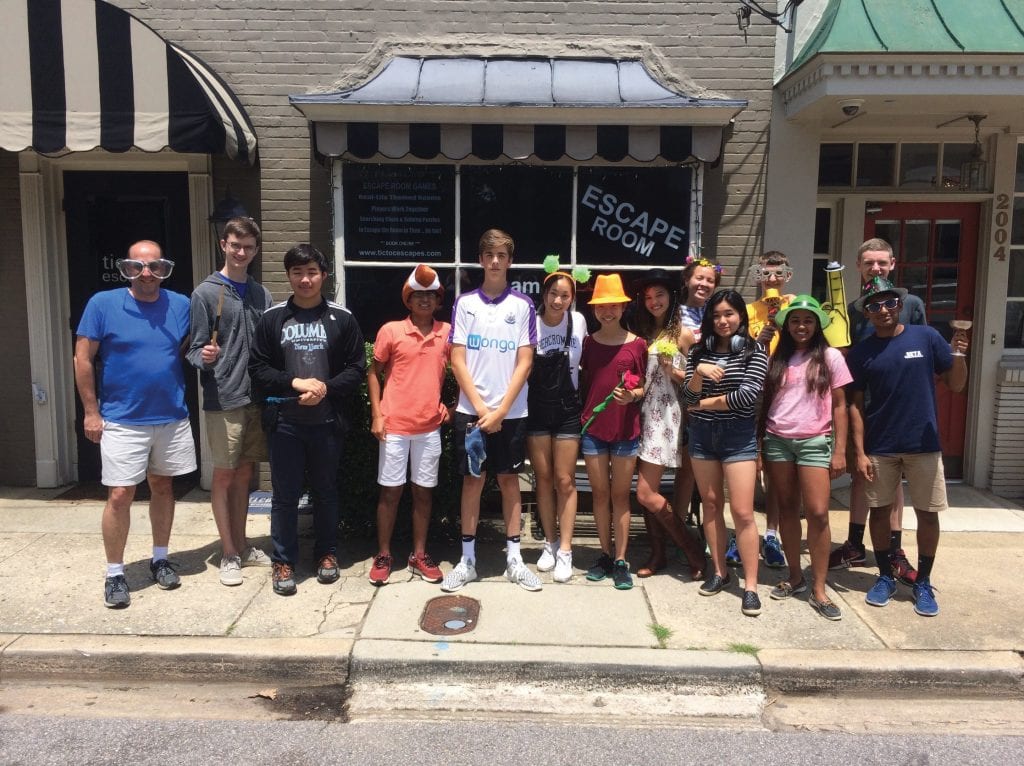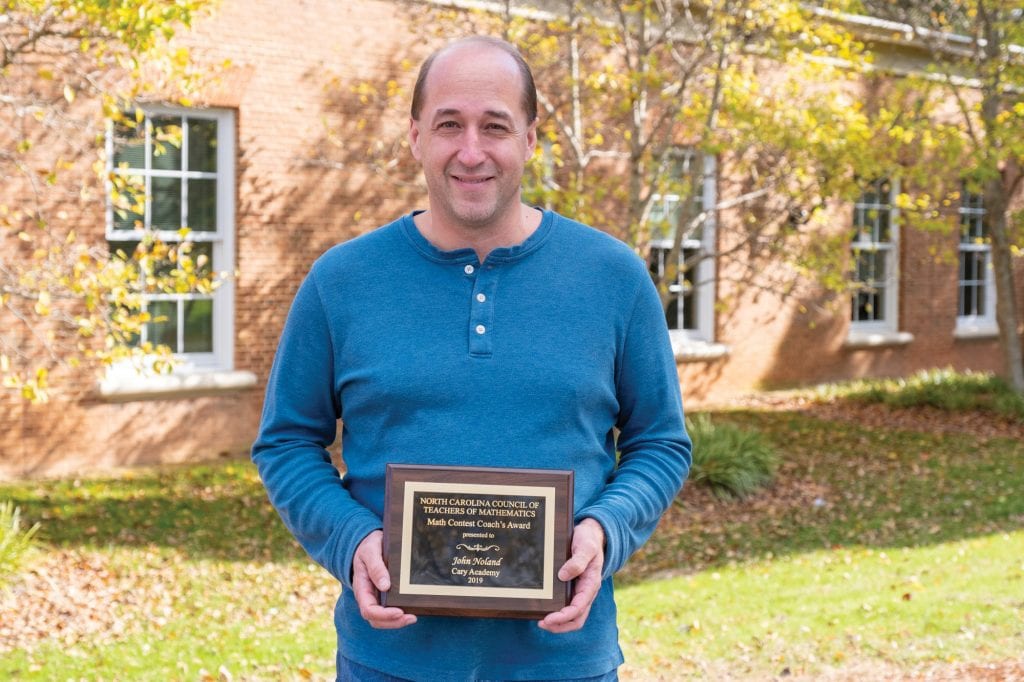When the north carolina council of teachers of mathematics awarded john noland the 2019 state math contest coach’s award, no one was surprised–except, maybe, john noland. Social media posts announcing the award were flooded with dozens of comments and well wishes from students, parents, alumni, and colleagues alike.
It’s a good bet that if you ask most people what their favorite subject in high school was, few will say “math.” For many, high school math was something to survive, an abstract concept typified by memorization and regurgitation and absent a link to the world beyond the classroom. However, no one who has learned math with Noland, during his 12 years at Cary Academy, would share that opinion.
The son of an environmental engineer and an accountant, math was always present in Noland’s life, its impact on the world around him apparent. His father’s work illustrated the importance of data collection and developing predictive models, while his mother’s fluency with finances showed him the relevance of math to everyday life. An avid chess and board game player, he saw mathematical influence in the games he played every day.
Ironically, though, Noland didn’t see a future in math for himself. When he began work on his undergraduate degree at Massachusetts Institute of Technology (MIT), Noland felt the need to capitalize upon his parents’ investment in his education. Concerned that a career in math might not be lucrative, he pursued an interest in computer programming and embarked on a computer science degree.
He soon realized, however, that the program’s heavy emphasis on electrical engineering—something he didn’t love—meant that he would be “blowing a lot of things up, and not in a good way.” In the end, he returned to math, realizing that the lifelong pursuit of his passion was value enough.

An unexpected value
It wasn’t until grad school at the University of New Hampshire that Noland found his true calling, while working as a teaching assistant in night school classes for adults. Though not the advanced multivariable subject matter that typically interested him, working with this group stirred a passion for teaching—and for making a tangible impact on his student’ lives.
His greatest enjoyment came from removing the discouraging stigmas and anxieties that students often encounter if they struggle with a math course.
“Many of my students didn’t think they were good at math,” explains Noland. “I realized that if I could help them overcome that— if I could help them to believe in themselves— it could open so many doors and make a real difference in their lives.” He adds, “That’s what keeps me going. It is what I still try to do in every class with my students at CA.”
Noland quickly found that rote memorization, while perhaps leading to better test scores, didn’t necessarily lead to true understanding. Instead, he found the key to helping students succeed was to relate math back to real life, to things that people could picture being useful.
“Anyone can learn rules, but to understand why and how math is useful in day-to-day life is the key to ‘getting it.’” A prime example plays out in Noland’s Calculus II class, where he challenges students to model the impact of various retirement savings strategies, teaching real-world financial literacy alongside the value of scenario modeling.
“What really excites me is showing how to use math to model something that students might not understand. The process of using math as a language to interpret what’s going on in the world around you—it is really powerful.”
Harmonic Progression
When Noland arrived at CA in 2008, after teaching in Wake County Public Schools for a decade, he focused on teaching that skillset—using math to decode the world and solve problems—to boost CA’s extracurricular math competition and chess club programs. “The tools were here; it just needed better utilization,” he offers.
An avid player, Noland sees chess as a way to teach both short-term problem solving and how to develop longer-term strategies for success. His successful opening gambit for improving CA’s chess club—which possessed talent but lacked focus—was to encourage more student participation in competitions and recording their moves to analyze later, collaboratively.
By shifting the math competition program to a formal class held during the school day, Noland reduced conflicts with other extracurricular competitions, such as debate. He created a space for students interested in problem solving to grow their skills and acumen, via games and collaboration.
Whether teaching advanced math, chess, or computer programming, Noland’s game-centric approach underscores his core teaching philosophy. “I think the more students can view hard math problems as something like a hard puzzle to solve, the more easily they are able to find a level of challenge where it feels fun to push themselves,” explains Noland.
“When you enjoy something and you’re willing to do it, it’s amazing how much you can grow and accomplish. If something feels like a chore, no matter how smart you are, it’s really tough to get it done.”
Games aren’t everything, though, and Noland is constantly refining his approach to meet students where they are. He recalls that his favorite Middle School math teacher’s game-centric approach meant that students like him, who exceled at quick response games, received more attention than his peers.
“I saw students—often the more thoughtful kids—get discouraged when they were left behind by rapid-fire teaching. It made me love math, but it also made me think critically about how we teach it. I realized that perspective really matters.
“No matter how well you think you’ve explained something, you have to understand that students don’t see things the way teachers do. Communication has to be both ways. My students have definitely helped me see problems and solutions in different—sometimes better—ways.”

Multiplicative Identity
Noland’s time at CA has been defined by collaborative learning opportunities. He cherishes learning new math skills and teaching insights at the annual Teaching Contemporary Mathematics conference. Team teaching Calculus I and II alongside his US math colleagues, Craig Lazarski, Kristi Ramey, and Shelton Shepherd provides him new perspectives. Co-teaching advanced computer programming with CA seniors helps him rethink the classroom experience—offering opportunities to even learn from his students to improve his understanding of machine learning.
Across all his endeavors, Noland is committed to creating personal, flexible, and relevant learning opportunities for his students. The innovative Advanced Calculus III course that Noland pioneered at CA and co-teaches with North Carolina State University faculty is just one such example.
In Calculus III, CA students pursue collegiate level mathematics while benefitting from the hands-on attention found in a high school classroom. “It helps divert some of the difficult collegiate experiences to a place where students have support, rather than facing them on their own,” explains Noland.
And that student support is crucial to Noland. He credits his children, Jack ’21 and Emma (a 9th grader at Enloe High School) with developing his empathy for the stress and workload that Upper School students sometimes carry across classes. For Noland, modeling understanding is as important as meeting goals: “I try to balance flexibility and accountability; sometimes life intrudes. It’s more important that they get to the point of learning the lesson, even if means missing a deadline or metric.”
Mathematics aside, what does Noland most hope his students take away from his classes? Resiliency, perseverance, and an enduring belief in themselves.
“Learning how to learn, how to change your perspective, how to persevere, focusing on what you want to achieve, even if it takes patience, learning how to face and rise to challenges—those are game-changers,” smiles Noland. “I want them to remember that someone encouraged them to keep going and believed in them, even if they didn’t think they would succeed—that’s what teaching is all about.”


